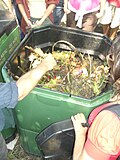Green waste
Green waste, also known as biological waste, refers to any organic waste that can be composted. It is primarily composed of yard trimmings, food waste, and other organic materials from residential, commercial, and industrial sources. Green waste is a valuable resource for composting and landscaping purposes, and its proper management is crucial for environmental sustainability.
Definition and Composition[edit]
Green waste encompasses a variety of organic materials, including:
- Grass clippings and lawn or garden waste
- Tree trimmings and shrubs
- Leaves
- Flowers and other garden debris
- Fruits and vegetables waste from kitchens
- Wood chips and sawdust from untreated wood
Benefits of Green Waste Recycling[edit]
Recycling green waste has numerous environmental benefits. It reduces the amount of waste sent to landfills, thereby decreasing greenhouse gas emissions, particularly methane, which is a potent greenhouse gas released from decomposing organic material in landfills. Composting green waste transforms it into a nutrient-rich soil amendment, enhancing soil health and reducing the need for chemical fertilizers. Additionally, it conserves water by improving soil structure and moisture retention.
Green Waste Management Practices[edit]
Effective green waste management involves several practices, including:
- Composting: The aerobic decomposition of organic waste into compost, which can be used as a soil conditioner.
- Mulching: Applying a layer of organic material over the soil to conserve moisture, improve fertility, and reduce weed growth.
- Vermicomposting: Using worms to decompose organic waste, producing a nutrient-rich material ideal for enhancing soil.
- Anaerobic digestion: Breaking down organic material in the absence of oxygen to produce biogas, which can be used as a renewable energy source.
Challenges in Green Waste Management[edit]
Despite its benefits, green waste management faces several challenges, including:
- Contamination with non-organic materials, which can hinder the recycling process.
- The need for public awareness and participation in proper green waste disposal practices.
- Variability in the composition of green waste, which can affect the quality of the compost produced.
- Regulatory and logistical challenges in collecting and processing green waste.
Future Perspectives[edit]
Advancements in technology and increased public awareness are expected to improve green waste management. Innovations in composting and anaerobic digestion technologies hold the potential to enhance the efficiency of green waste recycling. Furthermore, policies promoting the separation of organic waste at the source and the use of compostable materials can significantly reduce landfill waste and greenhouse gas emissions.
See Also[edit]

This article is a environment-related stub. You can help WikiMD by expanding it!
Ad. Transform your life with W8MD's Budget GLP-1 injections from $75


W8MD offers a medical weight loss program to lose weight in Philadelphia. Our physician-supervised medical weight loss provides:
- Weight loss injections in NYC (generic and brand names):
- Zepbound / Mounjaro, Wegovy / Ozempic, Saxenda
- Most insurances accepted or discounted self-pay rates. We will obtain insurance prior authorizations if needed.
- Generic GLP1 weight loss injections from $75 for the starting dose.
- Also offer prescription weight loss medications including Phentermine, Qsymia, Diethylpropion, Contrave etc.
NYC weight loss doctor appointmentsNYC weight loss doctor appointments
Start your NYC weight loss journey today at our NYC medical weight loss and Philadelphia medical weight loss clinics.
- Call 718-946-5500 to lose weight in NYC or for medical weight loss in Philadelphia 215-676-2334.
- Tags:NYC medical weight loss, Philadelphia lose weight Zepbound NYC, Budget GLP1 weight loss injections, Wegovy Philadelphia, Wegovy NYC, Philadelphia medical weight loss, Brookly weight loss and Wegovy NYC
|
WikiMD's Wellness Encyclopedia |
| Let Food Be Thy Medicine Medicine Thy Food - Hippocrates |
Medical Disclaimer: WikiMD is not a substitute for professional medical advice. The information on WikiMD is provided as an information resource only, may be incorrect, outdated or misleading, and is not to be used or relied on for any diagnostic or treatment purposes. Please consult your health care provider before making any healthcare decisions or for guidance about a specific medical condition. WikiMD expressly disclaims responsibility, and shall have no liability, for any damages, loss, injury, or liability whatsoever suffered as a result of your reliance on the information contained in this site. By visiting this site you agree to the foregoing terms and conditions, which may from time to time be changed or supplemented by WikiMD. If you do not agree to the foregoing terms and conditions, you should not enter or use this site. See full disclaimer.
Credits:Most images are courtesy of Wikimedia commons, and templates, categories Wikipedia, licensed under CC BY SA or similar.
Translate this page: - East Asian
中文,
日本,
한국어,
South Asian
हिन्दी,
தமிழ்,
తెలుగు,
Urdu,
ಕನ್ನಡ,
Southeast Asian
Indonesian,
Vietnamese,
Thai,
မြန်မာဘာသာ,
বাংলা
European
español,
Deutsch,
français,
Greek,
português do Brasil,
polski,
română,
русский,
Nederlands,
norsk,
svenska,
suomi,
Italian
Middle Eastern & African
عربى,
Turkish,
Persian,
Hebrew,
Afrikaans,
isiZulu,
Kiswahili,
Other
Bulgarian,
Hungarian,
Czech,
Swedish,
മലയാളം,
मराठी,
ਪੰਜਾਬੀ,
ગુજરાતી,
Portuguese,
Ukrainian

